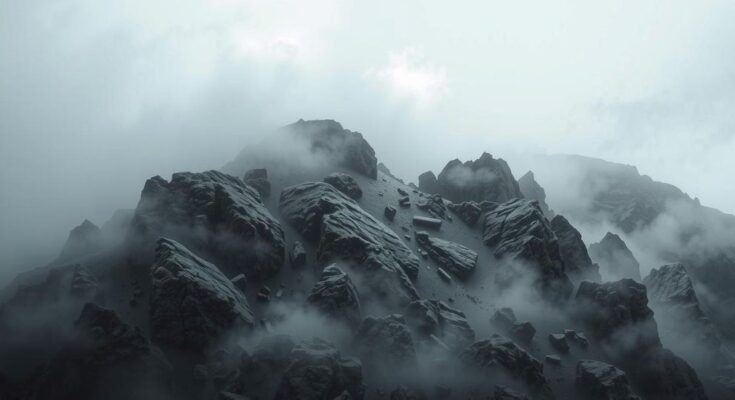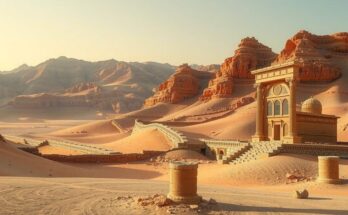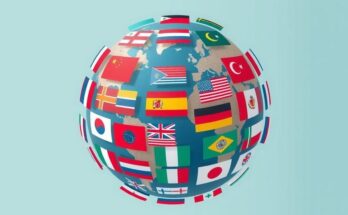Protests in Kinshasa against Rwandan President Kagame stem from accusations of his support for M23 rebels, who have taken control of Goma. UN experts affirm that the Rwandan military oversees M23 operations, while Kagame denies involvement. Goma’s strategic location exacerbates tensions, deeply rooted in historical conflict. Growing evidence of Rwanda’s backing complicates security dynamics, necessitating urgent mediation efforts to stabilize the region.
Protests have erupted in Kinshasa, the capital of the Democratic Republic of Congo (DRC), where demonstrators have burned images of Rwandan President Paul Kagame due to accusations that Rwanda supports the M23 rebel group, which has taken control of Goma. The United Nations has backed these claims, asserting that the Rwandan military exerts control over M23 operations, including training and equipping rebel fighters with advanced weaponry.
Strategically located near Lake Kivu and the Rwandan border, Goma is pivotal for trade and humanitarian efforts in the mineral-rich North Kivu province. The city has seen a surge in its population as people flee ongoing violence since the resurgence of the M23 conflict in late 2021. Recent clashes have intensified, leaving many injured or killed and further compromising essential services.
UN peacekeeping chief Jean-Pierre Lacroix confirmed the presence of Rwandan troops in Goma, noting the difficulty in estimating their numbers. While Kagama has consistently denied involvement, Richard Moncrief from the International Crisis Group argues that evidence increasingly supports Rwanda’s backing of the M23. Rwanda’s foreign ministry has stated that the conflict poses a threat to its national security, exemplifying the complex dynamics at play.
Kagame’s stance is influenced by the historical context of the Rwandan genocide, which led Hutu militias to seek refuge in the DRC, creating continued tensions. The M23’s motives are rooted in advocating for the Tutsi minority, and its resurgence is perceived as an effort by Kagame to exert influence over North Kivu amid shifting regional security dynamics. The allegations against the DRC’s military governor reflect the concerns of collaboration with groups associated with the genocide.
The M23 has been engaged in sophisticated military operations, receiving training that includes combat tactics and operational strategy, further complicating the conflict. The UN has reported evidence of Rwandan officers participating in training sessions for M23 recruits, highlighting persistent doubts about the Congolese military’s capacity to counter the M23’s gains.
With claims of operational support from both Rwanda and Uganda, Rwanda has accused Uganda of facilitating rebel movements across borders. The two nations have different interests in reinforcing or destabilizing the M23, contributing to regional instability. Rwanda regards the FDLR as an ongoing threat due to its past and is adamant that this concern should drive diplomatic discussions.
Rwanda’s recent military engagement with the M23 raises alarms about resource exploitation, particularly in capturing coltan-rich areas. The UN experts observed a marked increase in M23 profits through taxation, significantly benefiting its military agenda. Instances of advanced weaponry usage further indicate the sophisticated support supplemented by Rwanda.
Kagame has dismissed UN reports as skewed but faces growing scrutiny over military involvement in the DRC. Mediation efforts by the East African Community have encountered challenges, and Kagame’s insistence on addressing the FDLR as a priority complicates regional negotiations. Understanding the historical context and ongoing military actions is crucial to addressing the underlying issues in this escalating conflict.
The conflict in the eastern Democratic Republic of Congo has roots in the aftermath of the 1994 Rwandan genocide, which led to the migration of Hutu militias into Congo. There, they formed the Democratic Forces for the Liberation of Rwanda (FDLR), which remains active today. The resurgence of the M23 rebel group, composed primarily of Tutsi fighters, has highlighted ongoing ethnic tensions and the complex interplay of regional politics and security in this volatile area.
In summary, the ongoing conflict in the DRC is complicated by Rwanda’s alleged support for the M23 rebels and the deep-seated historical grievances stemming from the genocide. The UN findings provide crucial insight into the dynamics of military engagement and the implications for regional stability. Continued tensions between Congo and Rwanda necessitate comprehensive dialogue to address the underlying issues of security and resource management, particularly concerning the FDLR and the mining sector.
Original Source: www.bbc.com




